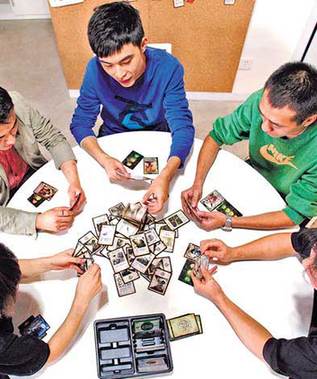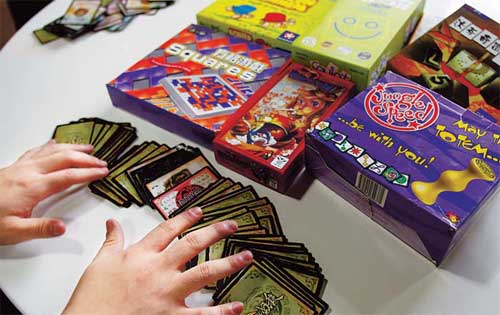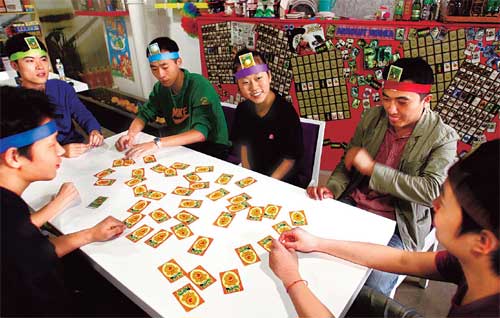Society
Breaking free from virtual reality and Web of boredom
By Zhou Wenting and Peng Yining in Beijing (China Daily)
Updated: 2010-10-12 07:04
 |
Large Medium Small |
 Young people enjoy the traditional appeal of card games at a Beijing bar in this file photo taken on Sept 30, as non-electronic games are making a resurgence. [Photo/China Daily]? |
Chen Wen admits she was starting to get weary of her "online life".
Despite spending at least eight hours a day staring at a screen at work, the 23-year-old said she would regularly head home to play Web games or visit chat rooms until well after midnight.
But that was until early this year, when she finally turned off her computer and tuned in to the latest craze sweeping the country - modern role-playing games.
"I'm fascinated with playing," said Chen, who works for a media organization in Shanghai.
"It's not just about the fun of the game but also the interaction with people; the jokes, the laughter.
"It's a million times better than looking at some cold screen all night," she added.
Chen is among a growing section of society - largely teenagers and 20-somethings - who are cutting back on cyberspace to spend more time playing card and board role-playing games, a trend sociologists say is being fueled by a desire to reconnect in the Internet age.
"Today, young people are immersed in the Internet all day long, for work and recreation," said Xia Xueluan, a professor at Peking University. "It has created a situation where people long for face-to-face communication to enhance friendships and foster interpersonal relationships in diverse ways."
So does that mean that the Web, long regarded by some as the ultimate form of escapism, is something people now need an escape from?
Zhu Hong, a 27-year-old Beijinger, said she believes the anonymous nature on the Internet damages social attachments rather than improves them, while the new wave of board games offers a sense of reality and intimacy.
Computers have taught people to conceal their identities, giving them a strong desire to hide, said the advertising agency manager, pointing out: "That's why when we talk to someone online, we're not even sure if they're a man or woman.
"We never reveal ourselves as much and as truly as during the new board games. We discuss everything - work stress, rumors, family, kids - things some people rarely talk about," said Zhu.
The games, which are played in large groups (often huddled around tables in 24-hour restaurants, university bars and games studios), are a mixture of luck and team strategy, meaning players must work together and discuss tactics if they want to win.
It is this interaction that experts say helps people develop closer relationships, in and out of the game.
Chen now plays with her friends and colleagues every day, squeezing games in during lunch breaks, happy hours on Friday nights and just before bed. They even played as they watched this summer's soccer World Cup finals in South Africa, looking up only to watch the slow-motion replays of goals.
A winning hand
The market for board and card games has been largely in decline since the introduction of the Internet. Yet, sales are now booming.
Yoka Games, a Beijing-based company launched in early 2008, reported that its popular game Sanguosha, or Killers of the Three Kingdoms, made 20 million yuan ($3 million) in sales in 2009. That figure is expected to rise to 100 million yuan this year.
As one of the first card-based role-playing games with Chinese elements, Sanguosha has won many fans in China. Using characters from the classic novel Romance of the Three Kingdoms, each player is given distinct skills and weapons.
Chen said one of the interns in her office was even nicknamed Xiao Qiao after a character in the game. "It gets into everything you do, into your bone marrow," she said.
The rising popularity in card and board games, particularly in China's major cities, is also a boon for games studios.
 Sanguosha, also known as Killers of the Three Kingdoms, which made 20 million yuan ($3 million) in sales last year for makers Yoka Games, has won many fans in China. Using characters from the classic novel Romance of the Three Kingdoms, each player is given a diff erent role with distinct skills and weapons. ? |
According to Dianping.com, a popular lifestyle website, there are 534 such studios in Shanghai and 150 in Beijing (one promotion for a business in the capital saw 8,000 tickets sold in just 24 hours).
Rong Minfeng, a board game enthusiast in Shanghai, said he has discovered at least 30 studios scattered throughout the city's bustling Xujiahui shopping area.
"There are about five in one apartment building, each having about seven tables," he said. "We still have to book ahead on weekends, though, or we'd have to wait in long lines."
The potential opportunity for profit has led to sharp increase in the overall number of games studios nationwide.
Chen Kai'en, 22, opened Gamebox in Shanghai with five friends early this year, although he insisted the business was about helping people to enjoy the games rather than make money.
"Entertainment activities are diverse today but students and office workers with modest incomes still have few options," he said.
Compared to karaoke clubs, which can charge hundreds of yuan for just a few hours, and restaurants, bars and games studios are an extremely cheap option, costing only about 30 yuan ($4) a time.
Gamebox, which is in a 90-square-meter unit of a downtown office building, barely makes enough to cover the rent, but Chen Kai'en said he does not care.
"Soccer is for men, karaoke requires a good voice, swimming needs a good physique - but card games are for everyone," he said.
"There's no limit on the number who can play, either. It's not unusual to see 20 people involved in one game," he said. "It's just a good way to unwind from work and expand your social network."
Generation game
It could be argued that the infatuation with new role-playing games among Chinese is simply a repeat of the fever that surrounded mahjong in the late 1970s. Like the modern games popular today, people played in large groups almost every day, often through the night.
"I used to lie to my wife that I was working overtime when I was playing mahjong with colleagues," said Liu Yuhe, a 67-year-old retired driver in Beijing. "We played mahjong in the workshop all night, drinking only tea so we stayed sober."
Since his retirement, he has traded in his tiles for Chinese chess, which he plays with the dozens of other elderly men who spend their days in the park near their residential building.
 Young people play Sanguosha at a bar in downtown Beijing. Nowadays many young people prefer to spend more time playing board and card games instead of going online, which sociologists say is a trend fueled by a desire to reconnect in the Internet age. “It’s not unusual to see 20 people involved in one game,” according to Chen Kai’en, who co-owns Gamebox in Shanghai. [Photo/China Daily]? |
As time has passed, the popularity of Liu's traditional games, such as mahjong, Chinese chess and go, has waned among young people.
"It's natural for games to change rapidly from generation to generation," said Zhou Xiaozheng, a sociology professor at Renmin University of China. "All trends fade away with the time."
However, the surge in modern role-playing games could present an opportunity for traditional pastimes to make a comeback, say experts.
"To compete with the modern games, old-fashioned ones need to be revamped and updated to keep them relevant, which in turn will protect this traditional culture," said Xia at Peking University.
He argued that many games had been unchanged for centuries and now fail to meet the needs of young people.
"Games today have counters and cards designed exquisitely in rich colors and styles," said media worker Chen Wen. "We had classes to teach us go and chess at elementary school but few of us play them now because they are boring and old-fashioned. They're just for grandfathers."
As well as incorporating elements of modern culture, such as the latest movies or television shows, manufactures of the new card- and board-based role-playing games also include CDs and DVDs to heighten the experience.
Shan Xiali, 48, head of the Shanghai Chess Academy, said Chinese chess and go have no shortage of elderly and teenaged fans, but very few in the 20 to 30 age bracket.
"Chinese chess has a large number of adult enthusiasts, while children tend to flock to go. A monthly go contest in Shanghai attracts more than 3,000 applicants aged 5 to 16," she said. Shan attributed the unpopularity of traditional games among young people to the sheer diverse range of recreations available today, compared to the limited options of past generations.
Today, a novel game that involves a large group of people and more communication is what people want after eight hours of soundless work in front of a computer, she said.
Shan is now working on ways to revamp its games to make them more attractive to the modern players.
And although many young people admitted to China Daily that they do not play traditional Chinese games, most insisted they will not let the old pastimes vanish entirely.
"When I have a child, I will send him or her to learn Chinese chess," said Li Hanyi, 22, a bank clerk in Suzhou, Jiangsu province. "That way, my child will get a quintessence understanding of Chinese culture and a calm mentality."